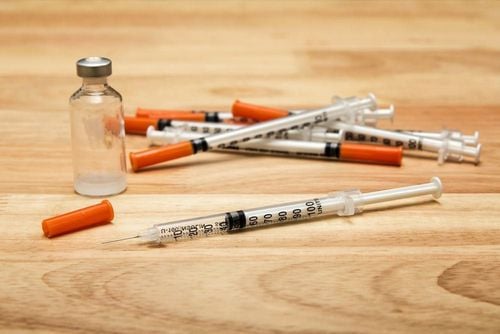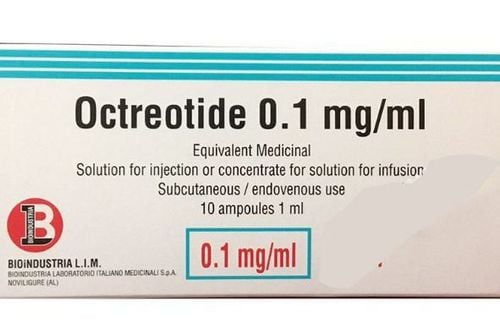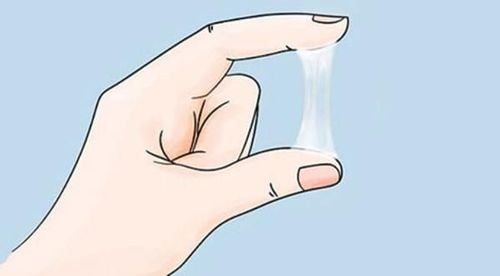This is an automatically translated article.
Children lacking growth hormone is an endocrine disorder, with prominent signs such as short children, slow growth. Timely detection and treatment of growth hormone deficiency is not only important for height growth but also for the overall endocrine development of children.
1. Causes of growth hormone deficiency
Growth hormone (GH) is produced by the anterior pituitary gland and plays an important role in the growth of the body. GH hormone stimulates cell growth, cell division, cell repair and metabolic activities such as: Increases synthesis of protein, fat, glucose... GH promotes bone growth from birth to puberty, assisting in recovery from injury and illness. In addition, GH also regulates red blood cell production and increases muscle mass.Children with growth hormone deficiency is an endocrine disorder, manifested by dwarfism and growth retardation. The rate of children with growth hormone deficiency is about 1/3500 - 1/4000, mild growth hormone deficiency can be seen in 1/2000 children. There are many causes of growth hormone deficiency in children such as:
Congenital anterior brain abnormalities, aplasia or hypoplasia of the pituitary gland during fetal life. Due to pathological conditions such as hypothalamic tumor , pituitary gland tumor or traumatic brain injury ; Pituitary gland damaged by irradiation treatment of tumors in the skull, nasopharyngeal area, eye socket,... Brain damage due to bacterial, viral, fungal infection...

Có nhiều nguyên nhân dẫn đến tình trạng trẻ thiếu hormone tăng trưởng
2. Signs children lack growth hormone
Children who lack growth hormone from a young age will be short, slower than their peers, <-2SD height compared to the normal population. Due to hypoplasia in the mid-face, the young face looks round and immature. Children have small limbs, small penis. Some children with growth hormone deficiency may have fat around the abdomen and be chubby despite normal body proportions.
If growth hormone deficiency occurs at later stages of life due to traumatic brain injury or brain tumor, the common symptoms are delayed puberty, delayed sexual development.
Children who lack growth hormone may also often feel tired, have poor tolerance, and are more sensitive to hot or cold temperatures.
Some psychological symptoms can also occur in children with growth hormone deficiency such as depression, lack of concentration, poor memory, anxiety or emotional changes,...
To diagnose the condition In the case of growth hormone deficiency, the doctor may order the child to perform a number of paraclinical techniques such as:
Blood tests to accurately quantify growth hormone and some other related hormones in the body. Static growth hormone test is often inaccurate, so dynamic tests such as insulin tolerance test, locomotor test, glucagon test, etc. are often used to quantify. X-rays to evaluate bone growth. If a pituitary gland lesion or tumor is suspected, an MRI of the pituitary gland and hypothalamus is ordered. The results of an MRI scan help determine whether problems with the pituitary gland are congenital, or are caused by trauma or tumors.

Trẻ thiếu hormone tăng trưởng từ lúc nhỏ sẽ thấp bé, chậm lớn hơn bạn bè
3. Treatment of growth hormone deficiency in children
Children with congenital growth hormone deficiency can be treated with growth hormone until puberty. If the child responds to treatment, the child will increase in height from 8 to 12 cm/year. The best time for growth hormone treatment in children is between 4-13 years of age, before the child's cartilages close. Treatment with growth hormone after puberty will no longer make sense. To achieve the best treatment effect, the child needs to be injected with the right dose and regularly as directed by the doctor. Children treated with growth hormone need to be examined every 3-6 months for a doctor to assess response to treatment and monitor side effects.
Most children who lacked growth hormone as children will produce adequate amounts of growth hormone as adults. However, a small number of children will still need lifelong treatment. By testing the amount of growth hormone in the blood, the doctor will determine if the child needs to continue to receive growth hormone injections.
Parents need to take their children to a reputable hospital to be examined by a specialist as soon as there are signs of growth hormone deficiency. Currently, Vinmec International General Hospital is one of the addresses that not only ensures professional quality with a team of leading doctors and nurses, a system of modern equipment and technology, but also stands out for its outstanding medical examination and treatment services. , comprehensive, professional medical consultation and treatment, civilized, polite, safe and maximum sterilization space. Customers when choosing to perform tests and treatment here can be completely assured of the accuracy of the results.
Please dial HOTLINE for more information or register for an appointment HERE. Download MyVinmec app to make appointments faster and to manage your bookings easily.













